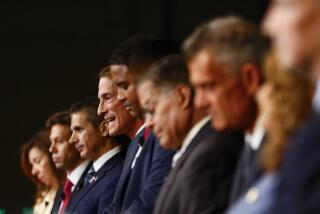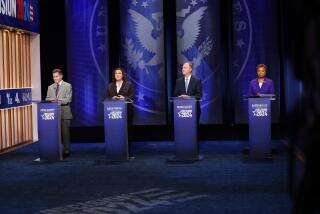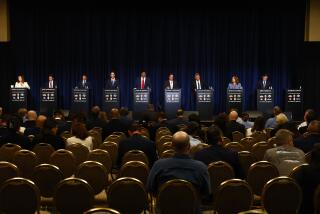Large field of candidates hoping to replace Harman is a challenge for debate organizers
Lou Baglietto Jr. set some tough rules for a recent congressional candidates’ debate: Participants needed a war chest of at least $50,000 or had to have made a good showing in a past election.
Some of the 16 people hoping to succeed former Rep. Jane Harman in this month’s special vote complained, but Baglietto, who helped organize the debate for the South Bay chambers of commerce, stuck to his guns. Anyone who didn’t meet his test was “not going to be competitive” in the race, he said, implying that including the also-runnings would be a waste of time.
So half the field was left out.
“He told me I didn’t have a chance, because I didn’t belong to one of the major parties and I didn’t have at least $50,000,” said Libertarian Steve Collett, a certified public accountant who got wind of the forum and asked to be included. He has participated in other debates to talk about his aims to cut defense spending and decriminalize drug use.
“I realize there are a lot of candidates, but certainly I was disappointed,” said Collett, who attended as a member of the audience so he could hear what the others had to say.
Last week, the LAX Coastal Area Chamber of Commerce went Baglietto one better — it limited its event at Loyola Marymount University to just three candidates it considered the frontrunners. Two Democrats, Los Angeles City Councilwoman Janice Hahn and California Secretary of State Debra Bowen, and Republican Redondo Beach Mayor Mike Gin participated.
The large field for Harman’s seat in the 36th Congressional District has posed special challenges for the organizers of that staple of political campaigns, the candidates’ debate. At least two dozen such scrums have punctuated the intense weeks since the March 25 close of filing, and organizers have looked for ways to keep them manageable and meaningful.
Democrats for Israel-Los Angeles packed a room in Hermosa Beach for a debate on U.S.-Israeli relations and Middle East policy that featured just four of the candidates. California Women Lead limited its upcoming candidate reception to the six females on the ballot.
The League of Women Voters invited all 16 hopefuls to its debate last week, set amid vintage cars in a large Torrance “garage” showroom. Thirteen showed up to sit on the long platform in front of a big American flag. The league ran a tight ship, restricting answers to some questions to 25 seconds and sounding alarms when the allotted time was exceeded.
Rule breakers invited rebuke. First-time political candidate Craig Huey, a Republican advertising business owner, used part of his opening statement to take a swipe at Harman for resigning and said she should pay for the special election required to replace her.
“It’s ridiculous what she—” Huey barked before the moderator cut him off with a swift, “OK, let’s keep our comments from denigrating others. Thank you.”
Political consultants say candidate debates are minefields for well-funded frontrunners, but they nonetheless feel obligated to participate or risk being accused of ducking public discussion.
“It’s an environment you don’t control, and there is always an opportunity for bad things to happen,” said campaign strategist Eric Hacopian. But “you have to go.”
Most of the debates are videotaped, so a misstep or just an uncomfortable moment can be broadly disseminated, said Hacopian, who is not working for any of the candidates in this contest.
An April 27 event in Venice, preceded by a peace rally, gave Democratic candidate Marcy Winograd a chance to put Bowen and Hahn on the spot. Antiwar activists at the rally had urged all candidates to sign a pledge that they would cut off funding for the wars in Iraq and Afghanistan. Winograd eagerly signed, but the other two declined, saying that although they opposed the wars they needed more information.
Winograd’s campaign website now features a video of Hahn and Bowen resisting calls to sign the pledge.
For inexperienced candidates lacking the money for a professional campaign, public forums, even if poorly attended and peopled mainly with competitors’ supporters, provide some exposure, as well as practice in honing stump skills.
“For a lot of candidates, the forums are their campaigns,” said Hacopian, “their opportunity to say their two cents’ worth.”
More to Read
Start your day right
Sign up for Essential California for news, features and recommendations from the L.A. Times and beyond in your inbox six days a week.
You may occasionally receive promotional content from the Los Angeles Times.







